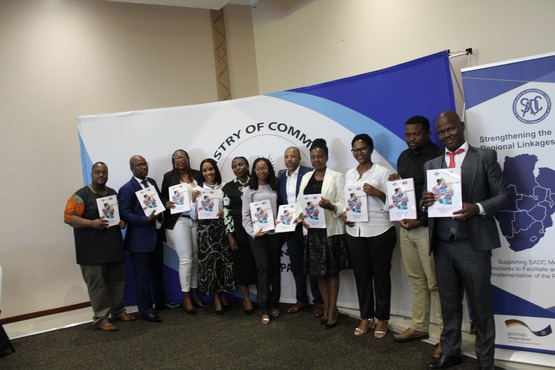The Kingdom of Eswatini Unveils Visionary Industrial Policy for Regional Prosperity

On February 15, 2024, Eswatini witnessed the official launch of its new Industrial Policy, marked by a ceremonial event held in Ezwulini. The launch of the newly developed successful completion of Industrial Policy (2023-2033), closely aligns with the Southern African Development Community (SADC) Industrialisation Strategy and Roadmap 2015–2063. This milestone signifies a strategic blueprint for fostering economic resilience, growth, and prosperity not only within Eswatini but also across the broader SADC region.
The successful formulation of this policy is the culmination of collaborative efforts, with support from various key stakeholders. The GIZ Strengthening National Regional Linkages in SADC Programme (SNRL), a SADC Programme commissioned by the German government, alongside the Investment Climate Reform Facility (ICR) and the GIZ Global project co-financed by the European Union (EU) and the German Federal Ministry for Economic Cooperation and Development (BMZ), played pivotal roles in its development.
During the initial phase, a review team comprising local officers from various governmental ministries in Eswatini and representatives from the private sector were empowered with the necessary skills to craft a pragmatic and participatory industrial policy. The overarching goal was to enhance Eswatini's industrialization efforts, bolster competitiveness, and drive growth in manufactured goods and exports.
The launch event, graced by esteemed guests, including Honorable Minister Dr. Tambo Gina, Acting Minister of Commerce, Industry and Trade (MCIT), underscored the policy's significance. Dr. Gina expressed gratitude to Eswatini's cabinet for approving the Industrial Policy on February 6, 2024, emphasizing its potential to address pressing economic challenges such as youth unemployment and poverty within both Eswatini and the broader SADC region.
Moreover, the policy's objectives include promoting Women Economic Empowerment by creating high-quality job opportunities for women, thereby reducing gender inequality and enhancing their participation in the economy.
Dr. Axel Bayer, a representative from the German Embassy to South Africa, Lesotho, and Eswatini, highlighted the critical role of women and youth in ensuring the policy's successful implementation.
The new Industrial Policy also stood out as a good example of learning for other SADC Member States as it is among the first SADC Member States to develop their national policy using “Enhancing the Quality of Industrial Policies” (EQuIP) methodology. The use of this methodology puts an emphasis on building capacities, ownership and leadership of local experts in the development process of policies.
Mr. Noel Lihiku, representing the Secretariat's Directorate of Industrial Development and Trade, emphasized that the Industrial Policy was crafted to ensure efficient production within SADC, leveraging the diverse comparative advantages of its member states.
In conclusion, Ms. Zamanyambose Mtetwa, Director of Industry (MCIT), commended the collaborative efforts of all stakeholders and highlighted the invaluable experience gained from the policy development process. She expressed confidence that Eswatini's achievement would serve as a model for industrialization efforts across the SADC region, signaling a promising future for economic growth and development.